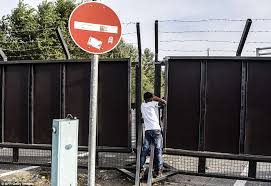 Let’s speak about migration again… In the midst of the migration crisis and the multitude of articles about Europe’s tightening inflow of migrants (e.g. here), it is quite refreshing to also read about the other side, namely the competition for migrants. A recent FT article reminds us of the global talent gap and the global battle companies face for the best employees. The majority of migration tends to imply an inflow of rather poorly educated and low-skilled people, while in terms of global talent gaps, we mainly speak about highly-skilled people… hence, it may seem understandable that Europe tries to close its gates for ‘some’, while keep them wide open and attractive for ‘others’. Yet, can we really manage a well-grounded separation and restrict the inflow of some migrants, while at the same time increasing the inflow of others?
Let’s speak about migration again… In the midst of the migration crisis and the multitude of articles about Europe’s tightening inflow of migrants (e.g. here), it is quite refreshing to also read about the other side, namely the competition for migrants. A recent FT article reminds us of the global talent gap and the global battle companies face for the best employees. The majority of migration tends to imply an inflow of rather poorly educated and low-skilled people, while in terms of global talent gaps, we mainly speak about highly-skilled people… hence, it may seem understandable that Europe tries to close its gates for ‘some’, while keep them wide open and attractive for ‘others’. Yet, can we really manage a well-grounded separation and restrict the inflow of some migrants, while at the same time increasing the inflow of others?
First of all, it is important to go back to the economic arguments in favor of migration, including refugees. As highlighted in many sources and discussed in one of my earlier blog posts, Europe’s population is aging and the working population is shrinking, thus there is a need for more people. As for the education and skill level, it is important to acknowledge that, although the popular perception of refugees goes along the lines of poor education and physical work skills, a substantial part of them, especially Syrian refugees, are also highly-skilled professionals with a solid educational background. Clearly, given the current chaos of refugee registration and background checks, it is probably difficult to set apart educated and skilled refugees – and ensure proper matching of skills and specific demands. But harsh migration policies, fences, and cut benefits might just leave everyone out… Although even these measures do not seem to have a very optimistic prognosis…
Importantly though, the very same measures may create extra burden for the intake of global professionals, who have nothing to do with illegal migration and asylum seeking. As pointed out in a recent FT article, multinational companies that are ready to move employees across borders, might not be ready for the complexities of countries’ migration regulations. As noted in the article, in efforts to fight the migration crisis, some governments are ‘ramping up costs as a way of reducing net migration’. As such, relocating a family of four to Britain currently costs at least five times as much as it would cost in the case of the US, and ten times more than relocating to Canada.
Another interesting way of decreasing net migration in Britain seems to be the requirements for the immigration of Britons’ foreign spouses. More specifically, as of 2012, in order to bring in their foreign spouses (from outside the EU) to the UK, British citizens and permanent residents have to meet an income threshold of £18,600 ($26,500), or higher if children are to come too. This policy makes Britain the strictest on family unification among 38 rich countries, which is probably why it is not surprising that the rules are challenged and brought to the Supreme Court in 2016. Indeed, the number of entering foreign spouses has declined after the policy was introduced, yet it is also a current reason why many British expatriates may have trouble returning from abroad with their foreign spouse. As the income (even if it is high) of foreign spouses is not taken into account in the policy, such policy may also restrict the migration of highly educated and highly skilled foreign spouses.
All in all, it is understandable that the current migration crisis urges for better solutions than uncontrolled migrant inflows. Yet, it is also worth considering the consequences of the newly introduced measures for keeping migrants away. What if these measures also keep away the necessary migrants Europe is trying to attract?


Good post. Yes, I totally agree with you especially that Europe’s working population is shrinking, thus there is a need for more qualified people.
Obviously Europe needs qualified working class but what happened to humanity. Are we gonna pick only qualified people and seperate the useless? It is sad.
Yes….there is a need for more qualified people in europe… As everywhere…